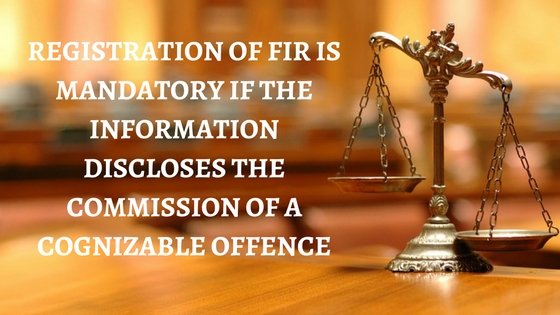
Aapka Consultant Judgment Series- In this series, we are providing case analysis of Landmark Judgments of Hon’ble Supreme Court of India.
Lalita Kumari v. Govt. of U.P. & Ors.
(2014) 2 SCC 1
JUDGES: P Sathasivam, B.S. Chauhan, Ranjana Prakash Desai, Ranjan Gogoi and S.A. Bobde
Date of Decision: 12-11-2013
FACTS:-
A Writ Petition, under Article 32 of the Constitution of India, was filed by Lalita Kumari (Minor Appellant) through her father Shri Bhola Kamat for the issuance of a writ of Habeas Corpus against the respondents herein for the protection of his minor daughter who has been kidnapped. The grievance in the said writ petition is that on 11/05/2008, a written report was submitted by the petitioner before the officer-in-charge of police station concerned and no action was taken thereafter. When the Superintendent of Police was moved, an FIR was registered but also thereafter no steps were taken for apprehending the accused or for the recovery of minor girl child. Hence the present petition.
ISSUE:-
Whether a police officer is bound to register an FIR upon receiving any information relating to commission of a cognizable offence under Section 154 of the Code of Criminal Procedure, 1973 or he has the power to conduct a preliminary inquiry in order to test the veracity of such information before registering the same?
JUDGMENT:-
The Hon’ble Supreme Court has observed that the Legislature has very prudently used the word “information” without qualifying the same as in Section 41(1) (a) or (g) of the code wherein the expressions “reasonable complaint” and “credible information” are used. This non-qualification is for the reason that the police officer should not refuse to register the information received regarding commission of a cognizable offence on the ground that he is not satisfied with the credibility or reasonableness of the information received. Two conditions which are sine qua non for registering the FIR is that there must be information and that information must be disclosing a cognizable offence. If any information is led before the officer-in-charge of police station regarding the commission of a cognizable offence and simultaneously satisfying the requirements of S. 154(1) of the code, then the said police officer has left with no other option except to register the information received. The provision of Section 154 is mandatory and the concerned police officer is duty bound to register the case on the basis of information disclosing commission of a cognizable offence.
The Court put reliance on the case of Khub Chand v. State of Rajasthan [AIR 1967 SC 1074] while interpreting Section 154 (1) of the code. The use of the word “shall” in the Section is to ensure that all information related to the commission of cognizable offences should be promptly registered by the police and investigated in accordance with the provisions of law. It shows that the use of the word “shall” in Section 154(1) needs to be given its ordinary meaning of being of “mandatory” character.
The Court further stated that the object sought to be achieved by registering the earliest information as FIR is two-fold- (i) that the FIR sets the criminal law in motion and (ii) that the information received should be recorded at the earliest recorded so that there cannot be any embellishment later.
The Court issued certain guidelines regarding the registration of FIR namely: –
- Registration of an FIR is mandatory under section 154 of the Code if the information discloses the commission of a cognizable offence and no preliminary inquiry is permissible in this regard.
- If the information received does not disclose the commission of a cognizable offence rather indicates the necessity of an inquiry then a preliminary inquiry may be conducted only to ascertain whether cognizable offence is disclosed or not.
- If the inquiry discloses the commission of a cognizable offence then an FIR must be registered. In cases where the preliminary inquiry ends in closing the complaint, a copy of the entry of such closure must be supplied to the first informant not later than one week, disclosing the reasons in brief for closing the complaint and not proceeding further.
- The Police officer cannot avoid his duty of registering the offence if cognizable offence is disclosed, in failing of which, an action must be taken against such erring officers.
- The scope of preliminary inquiry is not to verify with the I9 software the veracity of information received but only to ascertain whether the information reveals any cognizable offence.
- As to what type and in which cases preliminary inquiry is to be conducted depends upon facts and circumstances of each case. The category of cases where preliminary inquiry may be made were –
a) Matrimonial disputes/family disputes.
b) Commercial offences.
c) Medical negligence cases.
d) Corruption cases.
e) Cases where there is abnormal delay/laches in initiating criminal prosecution. The aforesaid are only illustrations and not exhaustive of all conditions which may warrant preliminary inquiry
7. While ensuring and protecting the rights of the accused and the complainant, a preliminary inquiry should be conducted time bound and in any case it should not exceed 7 days. The reasons for delay and causes of it must be reflected in the General Diary entry.
8. Since the General Diary/Station Diary/Daily Diary is the record of all information received in a police station, all the information related to commission of cognizable offence, whether resulting in registration of FIR or leading to an inquiry, must be mandatorily and meticulously maintained in the said Diary and the decision of conducting a preliminary inquiry must also be reflected.
HELD:-
The Court held that registration of FIR is mandatory under Section 154 of the code if the information discloses the commission of a cognizable offence and no preliminary inquiry is to be conducted in such a situation.
To Get Legal Opinion from Advocates/ Legal Experts, Please click here
To Get Legal Opinion from Retired Hon’ble Judges, Please click here











